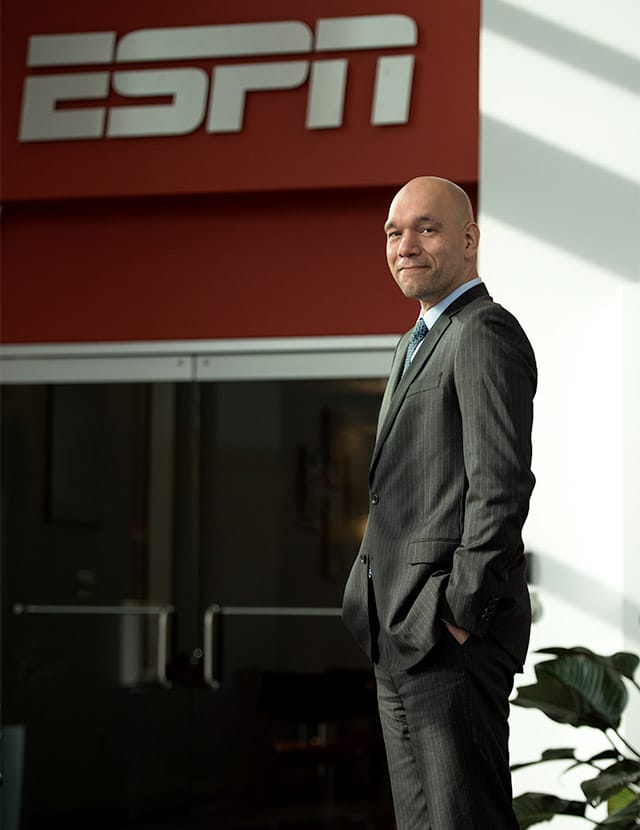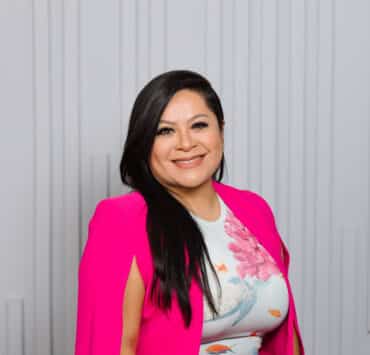|
Getting your Trinity Audio player ready...
|
The B, D, and 4 trains have a Yankee Stadium stop on their routes. During the off-season, this stop is home base for those who live in the neighborhood, but once the New York Yankees kick-off their season, 161st Street becomes a destination for residents and fans alike.
For Freddy Rolón, head of digital content & audience expansion at ESPN, Yankee Stadium is not just home. It has become a symbol of what grounds his career in sports media. Growing up along the Grand Concourse, the thoroughfare connecting the borough, taught him to be sensitive to a fanbase’s expectations and range of excitement.
“You could tell how good the matchup was by how many people were in the neighborhood,” Rolón says. “When you’re going to the deli, the line is really long if the Red Sox were in town, and you just had a better sense for the feel.”
The seasons come and go, but that feeling is the common thread tying all sports together. It’s what Rolón counts on in his day-to-day job and as a passionate sports fan.
“There’s still a need for community and things that bring us together,” he says. “Sports is more and more playing in that zone . . . In the way, people on the field adapt to what the other team is doing. We’re doing that for consumer behavior all the time.”
“There’s still a need for community and things that bring us together. Sports is more and more playing in that zone.”
Freddy Rolón
Sports’ impact on Rolón’s life is unquestionable. Beyond living next to one of the most iconic baseball stadiums in the world, the influx of baseball fans from all walks of life into his neighborhood taught him about the power of diversity. His perspective was expanded to not only notice the power of community but also develop a sense of how any community (from business to sports) is made more powerful when each individual is empowered to bring their full selves to the table.
“I try to tell my story, and I try to support other people [to remember that] everyone’s individual story is different, and you have to realize that everyone has a superpower,” he says. “You just have to own it and let it live with you. Whether you have an accent, whether you’re from a community and you’re the only one, which happens a lot, right? Just own it and you’ll find the opportunity. If you hide it, you won’t.”
Redefining Community, Constantly
When he began his career at ESPN, Rolón was working on his MBA at the Tuck School of Business at Dartmouth University. His ESPN internships overlapped with an interesting time for the company, as they were developing and launching their first Latino-focused network, ESPN Deportes.
It was more than kismet. It was a challenge requiring the unique skill set, perspective, and passion Rolón developed.
“I had an opportunity to do work that was probably well above my intern pay grade,” he says. “It was really one of the first times that I had an opportunity at work to bring my entire self because growing up as a sports fan, seeing my family—my dad, cousins, etcetera—experience sports fandom not in their preferred language helped me influence the conversation.

“Because of the sense of community and otherness that I knew,” he continues, “I was able to help with the research team [and ask questions] like ‘What are the community’s wants? What are the strategies that we can employ to reach out?’ These are easy to understand if you’re from that community, but they’re not necessarily the traditional marketing channels.”
As Rolón reflects on the trajectory of his decades-long career at ESPN, he recalls how much his love of sports and his ability to bring his whole self to work made taking a job at ESPN after graduation an easy choice.
“The other jobs I was looking at were English language networks with very much [a] focus on bringing business school skills, but they didn’t necessarily offer me a chance to be in a bilingual environment or talking about sports,” Rolón says. “[ESPN] really energized me and made me feel like, ‘Hey when I leave, I’m not necessarily drained. I still have energy and I’m energized to go the next day.’”
He aspires to cultivate the same sense of purpose and excitement for his team and the over four hundred employees reporting into his division. He’s motivated to cultivate this environment because he remembers how impacted he was by the one-on-one conversations he had early in his career with mentors carving out their own space out in the field. Although Rolón grew up spotting diversity on the field, the behind-the-scenes of the sports world was an enigma at first.
“When I was looking at transitioning from a consulting role into media, I did have a hard time thinking about where my place was, what are the roles—like what actually could I do not just at ESPN but at other media companies when I was first looking,” Rolón says. “I spent a lot of time talking to different folks and had the opportunity to talk to Peter Murphy, who led strategy at Disney, and Russell Wolf, who was an executive at ESPN running international at the time. Through both of those conversations, I saw an opportunity that wasn’t in front of the camera but kind of behind [them].”
“I try to tell my story, and I try to support other people [to remember that] everyone’s individual story is different and you have to kind of realize that everyone has a superpower. You just have to own it and let it live with you.”
Freddy Rolón
The Legacy of Bringing It All Full Circle
Rolón is a strategist and community-builder at heart, evidenced by his role at ESPN and his work beyond the screen. One such example includes his role as executive champion for ESPN’s Built to Play program, which revitalizes sports spaces in local communities. This program is just one of ESPN’s latest projects opened in Puerto Rico.
In the project launch’s press release, Rolón said:
“I have always believed that we do our best work when we can use the power of the ESPN brand to serve as an agent of change and bring positive impact to communities.”
In his Hispanic Executive interview, Rolón built upon the same sentiment when speaking about the importance of cultivating an environment at work that allows for greatness and humanness simultaneously.
“We can strive for excellence and still have fun, right?” Rolón says. “That’s kind of my philosophy at work, which is we do things that are important—we’re not necessarily brain surgeons, and there’s no one whose life is in danger necessarily based on decisions we make. But it’s important work and there’s a striving to be good, excellent, as close to perfect as we can, but that should still be in an environment where we’re having fun and we are supportive of each other.”

